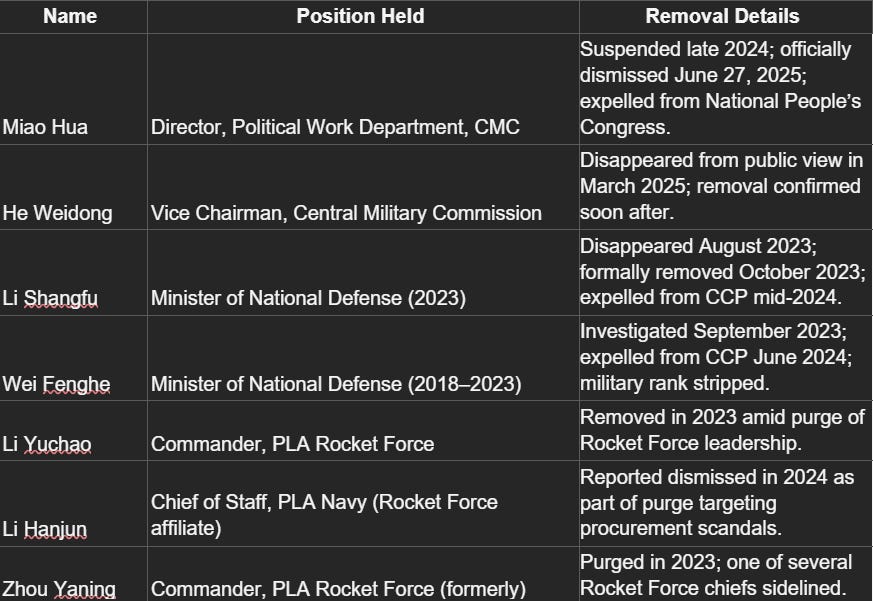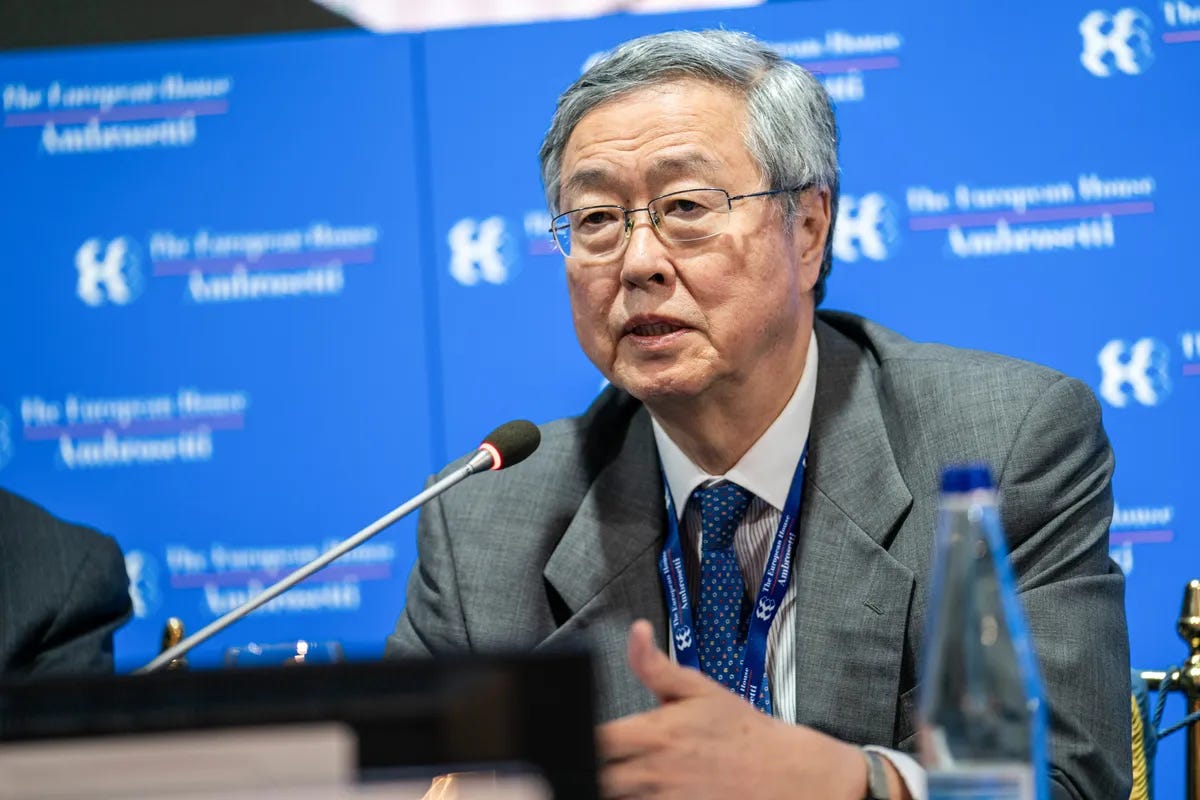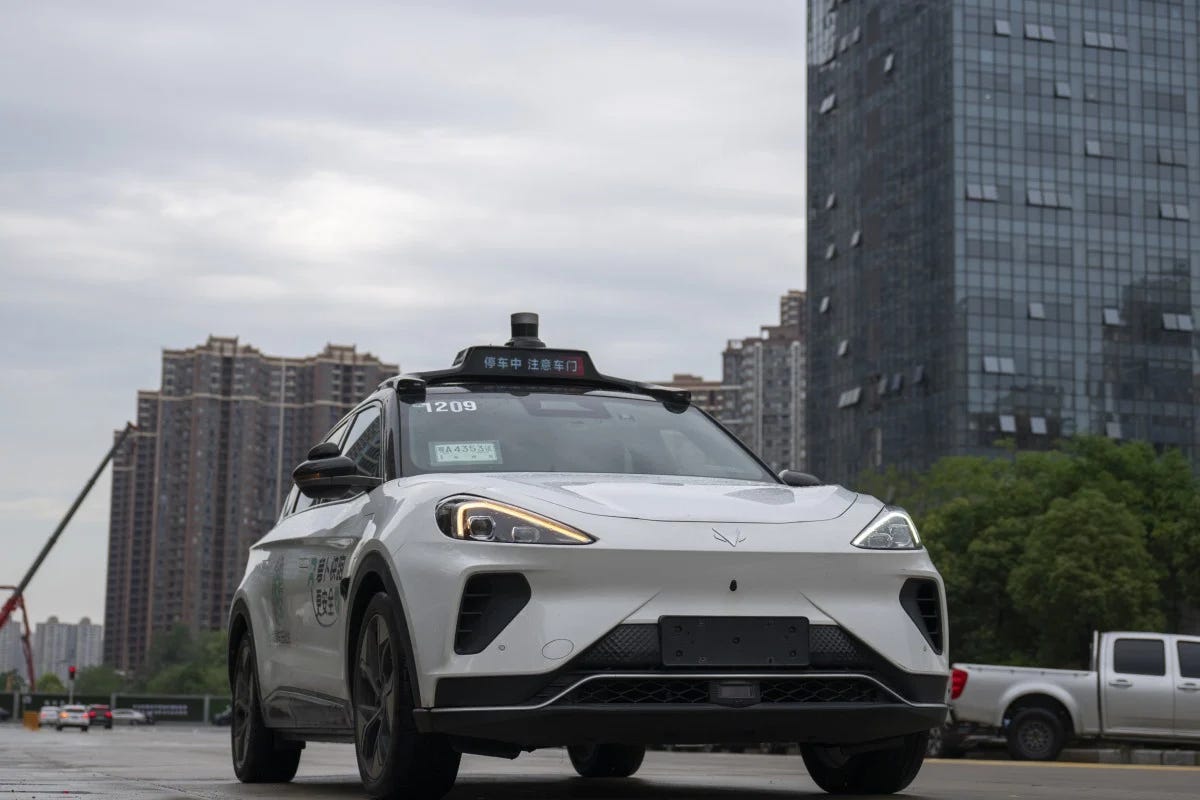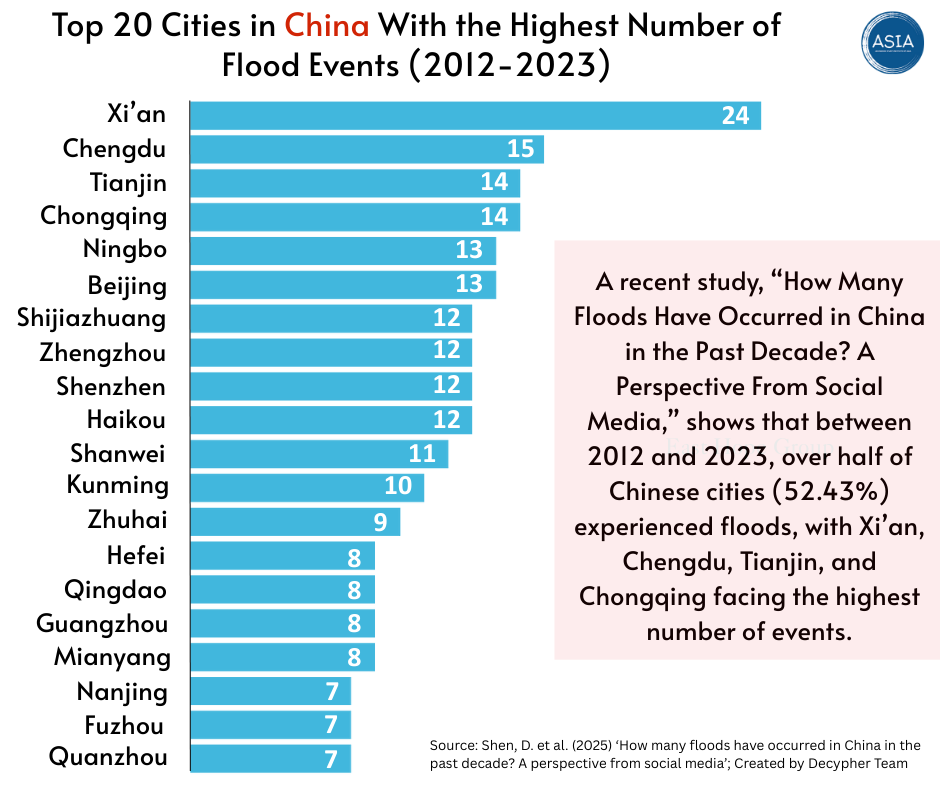China This Week: Xi’s Military Purge, Putin & Kim to join Beijing Parade, Trump’s Nuclear Proposal Rejected
This week in China, we explore key shifts in its domestic and foreign policy landscape as well as a closer look at Xi's control over military purges.
China Quote 🗩
“No doubt there’s a lot of turbulence in the upper echelons right now.”
James Char, Singapore-based assistant professor at Nanyang Technological University, who researches China’s military.
Xi’s Purge of the Generals
Is Xi Jinping cementing his grip on power, or does the scale of the purges expose its fragility? Are these sweeping removals a bold display of control, or a warning sign of weakness within the system? We must examine closely what these purges reveal about Xi, the Chinese military, and the Communist Party itself.
At the end of June, China’s military establishment was jolted by a purge of stunning scale. Nearly 90 senior officers, many of them once considered untouchable, were suddenly stripped of their posts. For a system that prides itself on control and continuity, the spectacle of almost a fifth of top generals swept away was a reminder of how fragile power can be, even in one of the world’s most disciplined armed forces.
The purge began quietly, with whispers of suspensions in late 2024. But the pace quickened in 2025. By mid-summer, figures who only months earlier stood beside Xi Jinping at military parades had vanished from view. Vice Chairman He Weidong, once the second-most powerful officer in the People’s Liberation Army, was removed in March. Admiral Miao Hua, the former head of the Political Work Department, was officially dismissed in June after being suspended for months. Former defence ministers Li Shangfu and Wei Fenghe, both once fixtures at Xi’s side, were expelled from the Communist Party. The most striking element was the profile of those targeted. These were not distant rivals from a past era. Many were men elevated during Xi’s own decade of consolidating authority, promoted because they were thought to be loyal.
The Battle Within
For Xi, the military has always been the most sensitive arena. It is both sword and shield: the guarantor of regime survival and the instrument of his ambitions abroad. To lose control of the PLA is unthinkable. And yet the pattern of purges suggests unease at the very top.
Corruption is the official reason offered, and there is truth to it. The PLA Rocket Force, which oversees China’s nuclear missiles, was rocked last year by reports of graft in procurement and weapons testing. Several senior commanders were implicated, fueling speculation about inflated contracts and defective systems. But to stop there would be to miss the larger picture. What is unfolding is less a clean-up than a recalibration. Xi is making sure that the men with guns, missiles, and ships answer only to him and not to old networks, not to personal patrons, not even to their own professional camaraderie.
The removal of vice chairmen, defence ministers, and the head of political work within the Central Military Commission is telling. These personnel are the connective tissue between party and army, the figures who translate ideology into orders and ensure obedience runs down the chain of command. By cutting them away, Xi is pruning branches that could one day grow in directions he does not control.
Power and Its Costs
The human side of this drama is often overlooked. Careers built over decades have ended in a flash. He Weidong rose through the Eastern Theater Command, responsible for Taiwan operations, and was once considered indispensable. Li Shangfu, a technocrat who oversaw weapons procurement, had been sanctioned by Washington before becoming the defence minister. Both men are now erased from official websites. Within the barracks and academies, younger officers are watching closely. Loyalty is rewarded, but it is never permanent. If even those closest to Xi can fall, then everyone is replaceable. That breeds obedience, but it also breeds caution, and perhaps fear.
The effect on China’s military modernisation is harder to measure but impossible to ignore. Ambitious plans call for a world-class force by 2027, one capable of withstanding if not challenging the United States in the Pacific and projecting power into new theatres. That timeline depends on equipment and budgets, as well as leadership continuity and institutional trust. Constant turnover at the top complicates those goals. Fresh commanders may bring zeal, but they must learn to navigate the system, and they know their survival depends as much on political instincts as on battlefield competence.
A Double-Edged Sword
Xi’s gamble is clear. He wants an unshakably loyal force. History shows that rulers who purge too often risk hollowing out the very institutions they seek to control. Yet from his perspective, the greater danger lies in leaving potential rivals untouched. A general with independent influence is a general who might hesitate at a critical moment.
This is why the purge extends even to his own appointees. Miao Hua was thought to be one of Xi’s closest allies, his rise tied to Xi’s tenure in Fujian decades ago. Yet he was removed without ceremony. Xi is signalling that loyalty yesterday is no guarantee today. In that sense, the campaign is as much about psychology as it is about politics.
What Does It Mean for the Party?
Beyond the military, the cascading purges may be delivering a broader message or raising questions. Analysts note that among the 205 full members of the 20th Central Committee, roughly 9 percent have been purged, sidelined, or disappeared in just over two years. It remains unclear whether the Party intended to send a deliberate signal of unity or whether these moves reflect deeper anxiety about factional loyalties and institutional cohesion. Either way, the Party’s next moves will be closely watched for signs of whether this is a stabilising purge or one that hides fracturing beneath the surface.
Regional Stakes
All of this unfolds against a backdrop of mounting tensions in Asia. Taiwan remains the central flashpoint, but maritime disputes in the South China Sea and border frictions with India keep the PLA stretched across multiple fronts. To outside observers, China’s displays of strength like naval patrols, joint exercises, missile drills project confidence. Yet beneath the surface lies a military leadership in flux.
For Washington, Tokyo, and New Delhi, the purge is a double-edged signal. On the one hand, it suggests Xi is tightening his grip, unwilling to tolerate even a hint of dissent. On the other hand, it might also hint at vulnerabilities inside the command structure. A system consumed with internal policing may be less agile in a crisis, more cautious about escalation, and more dependent on the calculations of a single man at the apex of power.
The Larger Story
What emerges is the story of a leader who has built his rule on control and is unwilling to share even a sliver of it. Xi Jinping is reshaping the Chinese military in his own image: centralised, uncompromising, and insulated from the old networks of patronage.
The purge will not end here. More names will fall, more titles will be erased, and more officers will find that yesterday’s loyalty is no shield against today’s suspicion. For Xi, this is the price of power. For China’s military, it is a reminder that its greatest battles are maybe not always fought on the seas or in the skies, but within its own ranks.
Notables purges in military
Economic Activity🏦
China’s ‘Big Five’ Banks Strain Under Consumer Debt
FT reports that China’s top lenders face rising consumer loan defaults and record-low margins as stagnant wages and a weak property market hurt credit demand. ICBC’s non-performing consumer loans doubled to over Rmb10bn, while combined bad loans at major banks have more than doubled since late 2023.
Former PBOC Chief Warns Against Stablecoin Push
Bloomberg reports that Zhou Xiaochuan, former head of China’s central bank, cautioned that speculation in stablecoins could threaten financial stability. His comments oppose calls from policy advisers urging Beijing to explore their adoption.
Evergrande Delisted From Hong Kong Exchange
The Guardian reports that Evergrande, once China’s largest property developer, has been removed from the Hong Kong stock exchange after failing to resolve its $300bn debt crisis. The developer lost over 99% of its market value from its 2017 peak, marking a dramatic collapse for China’s real estate sector.
Audits Reveal Pension Payments to the Dead
Caixin reports that government audits found millions of yuan in improper pension disbursements across provinces, including payments to deceased individuals. In Shandong alone, 2.41 million yuan was wrongly paid to 505 dead people, exposing deep flaws in China’s social security system.
AI Chipmaker Cambricon Warns Investors After Stock Frenzy
Bloomberg reports that Cambricon Technologies’ shares fell nearly 9% after the firm cautioned that its recent doubling in value was fueled by speculation. The company stressed it faces US sanctions and lacks new products in the pipeline, tempering hype around China’s AI chip boom.
Extreme Rain Causes $2.8 Billion in Road Damage
Straits Times reports that heavy rainfall across 23 provinces has destroyed over 16 billion yuan worth of roads, adding pressure to China’s already strained public finances. The government has issued emergency repair subsidies, but indebted local authorities face mounting climate-related costs.
UK Imports of Low-Value Parcels From China Surge
BBC reports that the value of small parcels from China to the UK more than doubled to £3bn last year, driven by Shein and Temu. Industry groups warn the tax-free imports undercut British retailers, while the government reviews rules on low-value goods.
China to Impose Absolute Emissions Caps by 2027
Dialogue Earth reports that Beijing will introduce absolute emissions caps across major industries by 2027, moving beyond its current intensity-based system. The reforms pave the way for a nationwide carbon trading scheme by 2030 and come amid rising trade pressures such as the EU’s carbon border tax.
Inside China🐉
Top Students Choose Vocational Schools Over Elites
Caixin reports that more Chinese high achievers are bypassing elite universities for vocational and technical programs, seeking better job prospects amid a weak economy and tough labor market competition.
China Launches K Visa to Attract Young STEM Talent
Straits Times reports that Beijing will roll out a new K visa from October to draw early-career foreign STEM talent without employer sponsorship. Analysts say the policy highlights both China’s tech ambitions and its anxieties over domestic innovation bottlenecks.
Malaysia’s Top Deep-Sea Robotics Scientist Moves to China

SCMP reports that Professor Mohd Rizal Arshad, Malaysia’s leading marine robotics expert, has relocated to Jiangsu as dean of Xi’an Jiaotong-Liverpool University’s robotics school. Rizal cited China’s strong research-to-industry ecosystem and access to components as key factors, and plans to develop new underwater robotic prototypes for deep-sea exploration in Chinese waters.
China and the World🌏
Secret Xi Letter Helped Revive India-China Ties
Bloomberg reports that Beijing quietly reached out to New Delhi in March, with Xi Jinping sending a letter to India’s president as US tariffs escalated. Since then, both sides have eased restrictions, resumed talks on border disputes, and moved to restart flights and trade, ahead of Modi’s first China visit in seven years.
Xi to Host Putin and Kim at Beijing Military Parade
CNN reports that Russian President Vladimir Putin and North Korean leader Kim Jong Un will attend China’s September 3 military parade in Beijing, a show of unity amid global tensions. The event will feature over 10,000 troops and advanced weaponry, underscoring Xi’s push to project China’s growing military power.
China Rejects Trump’s Nuclear Talks Proposal
CBS reports that Beijing refused to join US-Russia nuclear disarmament negotiations, dismissing Trump’s proposal as “neither reasonable nor realistic.” Officials stressed China’s much smaller arsenal compared to Washington and Moscow, and reiterated that the largest nuclear powers must take primary responsibility.
NYT Probe Reveals China’s Influence in New York Elections
NYT reports that Beijing has quietly mobilised dozens of hometown associations in New York City to back pro-China politicians and undermine critics, including those supporting Taiwan or Hong Kong democracy. The consulate’s covert influence has shaped local races, raising concerns over foreign meddling in US politics.
FBI Warns of Expanded China Hacking Campaign
Washington Post reports that a Chinese state-linked hacking operation has struck at least 200 US organisations and 80 countries, targeting telecoms, infrastructure, and politicians. The FBI and allied agencies called it one of the most extensive campaigns in modern history, far exceeding accepted norms for cyberspace spying.
China and Russia Conduct First Joint Submarine Patrol
CNN reports that Chinese and Russian diesel-electric submarines carried out their first-ever joint patrol in the Pacific this month, covering the Sea of Japan and East China Sea. The move signals deepening military cooperation as both navies expand joint operations from Asia to the Arctic.
Taiwan Says China Spent $21 Billion on Pacific Drills in 2024
Reuters reports that Taiwan estimates China spent $21 billion on military drills in the Taiwan Strait, East and South China Seas, and the Western Pacific last year, a 40% jump from 2023. Chinese aircraft flew nearly 12,000 sorties and naval vessels logged more than 2 million hours at sea, with one-third of activity concentrated in the South China Sea. Taipei said the surge highlights Beijing’s push to normalise power projection around the first island chain.
ABC Returns to Beijing with Allyson Horn Appointment
ABC News reports that Allyson Horn will become the broadcaster’s first China correspondent in nearly five years, marking a “significant milestone” after the 2020 departure of Bill Birtles during a diplomatic standoff. The appointment underscores ABC’s push to bolster Asia-Pacific coverage and restore its long tradition of reporting from Beijing.
Tech in China🖥️
China Could See 300,000 Driverless Taxis by 2030
SCMP reports that UBS forecasts 300,000 robotaxis could be operating in Beijing, Shanghai, Guangzhou and Shenzhen by 2030, rising to 4 million nationwide by the late 2030s. Falling EV production costs and rising labor expenses are driving adoption, with the robotaxi market projected to reach US$183 billion annually if widely deployed. Leading players include Baidu’s Apollo, Pony.ai and WeRide, with Tesla also seeking entry.
Huawei Launches New Storage Products for AI Computing
Tech in Asia reports that Huawei has rolled out a new line of data storage systems designed to meet the surging demand from artificial intelligence applications. The products aim to handle massive workloads and support China’s push for greater self-reliance in AI infrastructure amid U.S. tech restrictions.
Decypher Data Dive📊
A recent study, “How Many Floods Have Occurred in China in the Past Decade? A Perspective From Social Media,” investigates flood occurrences across China between 2012 and 2023. The analysis reveals that 52.43% of Chinese cities experienced flood events during this period, with Xi’an, Chengdu, Tianjin, and Chongqing recording the highest frequencies. In total, 674 validated flood events were detected, with a pronounced concentration in eastern and central regions of the country.
Image of the Week📸
Chinese troops rehearse Victory Day parade to mark 80th anniversary of end of WWII
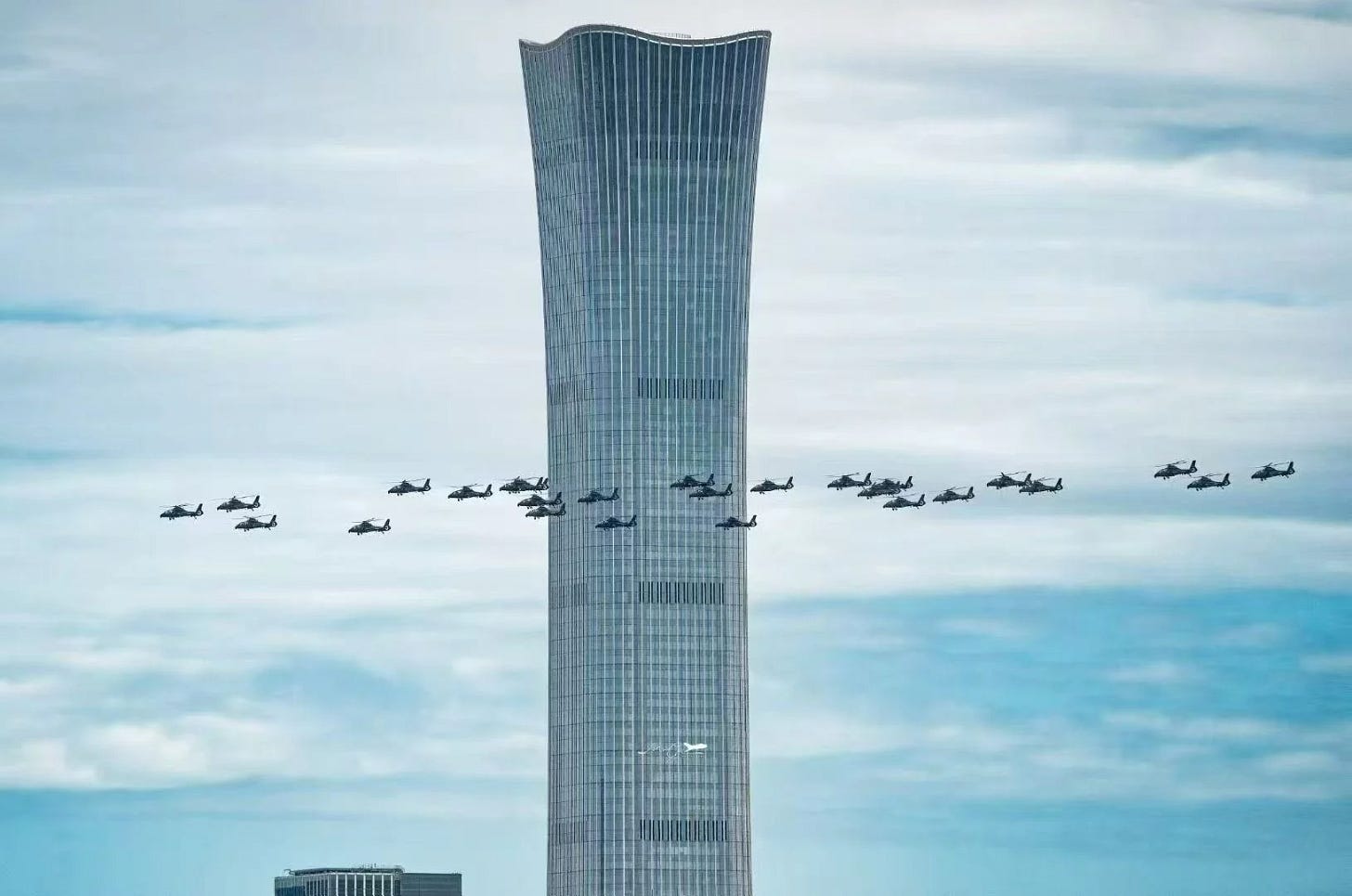
— — —
Microessay By Manash
Data By Bhupesh
Edited By Aurko
Produced by Decypher Team in New Delhi, India


